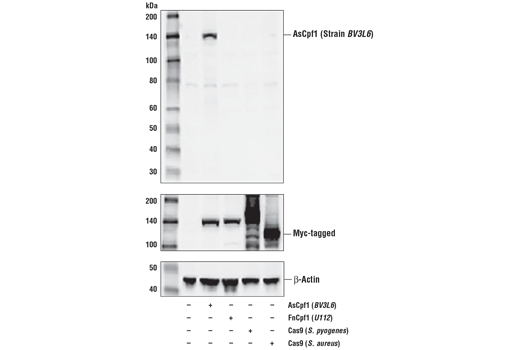WB
All
Transfected Only
151
Rabbit
#U2UMQ6
Product Information
Product Usage Information
| Application | Dilution |
|---|---|
| Western Blotting | 1:1000 |
Storage
Specificity / Sensitivity
Species Reactivity:
All Species Expected
Source / Purification
Polyclonal antibodies are produced by immunizing animals with a synthetic peptide corresponding to residues surrounding Ile57 of Acidaminococcus sp. Cpf1/Cas12a (Strain BV3L6) protein. Antibodies are purified by protein A and peptide affinity chromatography.
Background
CRISPR-Cas (clustered regularly interspaced short palindromic repeats and CRISPR-associated proteins) are RNA-guided nuclease effectors that are utilized for precise genome editing in mammalian systems (1). Cpf1/Cas12a (CRISPR from Prevotella and Francisella) proteins are members of the Class 2 CRISPR system (2). Class 2 CRISPR systems, such as the well characterized Cas9, rely on single-component effector proteins to mediate DNA interference (3). Cpf1/Cas12a endonucleases, compared to Cas9 systems, have several unique features that increase the utility of CRISPR-based genome editing techniques: 1) Cpf1/Cas12a-mediated cleavage relies on a single and short CRISPR RNA (crRNA) without the requirement of a trans-activating crRNA (tracrRNA), 2) Cpf1/Cas12a utilizes T-Rich protospacer-adjacent motif (PAM) sequences rather than a G-Rich PAM, and 3) Cpf1/Cas12a generates a staggered, rather than a blunt-ended, DNA double-stranded break (2). These features broaden the utility of using CRISPR-Cas systems for specific gene regulation and therapeutic applications. Several Cpf1/Cas12a bacterial orthologs have been characterized for CRISPR-mediated mammalian genome editing (2,4). AsCpf1 (Strain BV3L6)/Cas12a is a Cpf1/Cas12a enzyme derived from Acidaminococcus sp. BV3L6 (5,6).
Species Reactivity
Species reactivity is determined by testing in at least one approved application (e.g., western blot).
Western Blot Buffer
IMPORTANT: For western blots, incubate membrane with diluted primary antibody in 5% w/v nonfat dry milk, 1X TBS, 0.1% Tween® 20 at 4°C with gentle shaking, overnight.
Applications Key
WB: Western Blotting
Cross-Reactivity Key
H: human M: mouse R: rat Hm: hamster Mk: monkey Vir: virus Mi: mink C: chicken Dm: D. melanogaster X: Xenopus Z: zebrafish B: bovine Dg: dog Pg: pig Sc: S. cerevisiae Ce: C. elegans Hr: horse GP: Guinea Pig Rab: rabbit All: all species expected
Trademarks and Patents
Limited Uses
Except as otherwise expressly agreed in a writing signed by a legally authorized representative of CST, the following terms apply to Products provided by CST, its affiliates or its distributors. Any Customer's terms and conditions that are in addition to, or different from, those contained herein, unless separately accepted in writing by a legally authorized representative of CST, are rejected and are of no force or effect.
Products are labeled with For Research Use Only or a similar labeling statement and have not been approved, cleared, or licensed by the FDA or other regulatory foreign or domestic entity, for any purpose. Customer shall not use any Product for any diagnostic or therapeutic purpose, or otherwise in any manner that conflicts with its labeling statement. Products sold or licensed by CST are provided for Customer as the end-user and solely for research and development uses. Any use of Product for diagnostic, prophylactic or therapeutic purposes, or any purchase of Product for resale (alone or as a component) or other commercial purpose, requires a separate license from CST. Customer shall (a) not sell, license, loan, donate or otherwise transfer or make available any Product to any third party, whether alone or in combination with other materials, or use the Products to manufacture any commercial products, (b) not copy, modify, reverse engineer, decompile, disassemble or otherwise attempt to discover the underlying structure or technology of the Products, or use the Products for the purpose of developing any products or services that would compete with CST products or services, (c) not alter or remove from the Products any trademarks, trade names, logos, patent or copyright notices or markings, (d) use the Products solely in accordance with CST Product Terms of Sale and any applicable documentation, and (e) comply with any license, terms of service or similar agreement with respect to any third party products or services used by Customer in connection with the Products.
